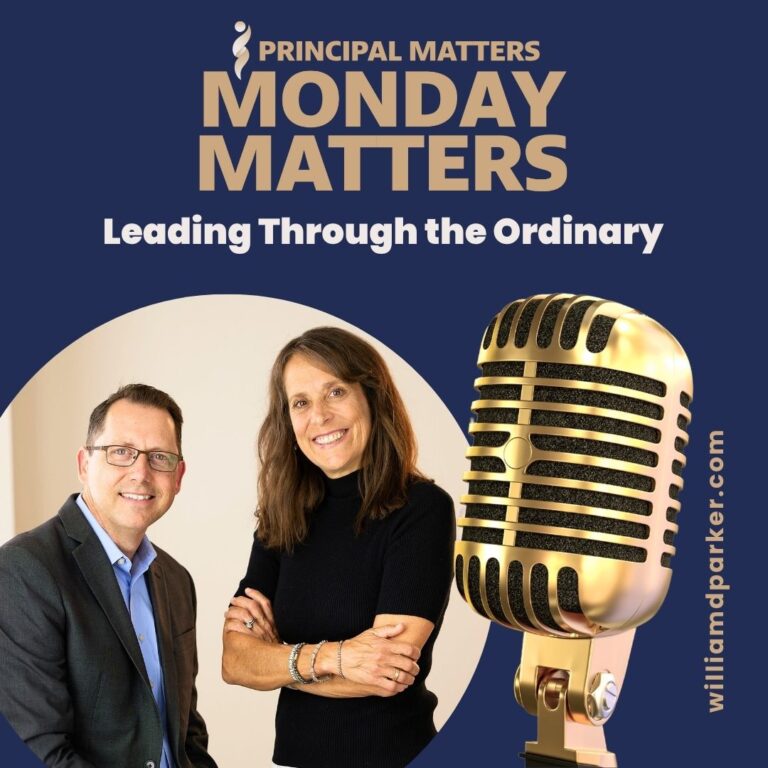Podcast: Play in new window | Download
Last week was the first time (except for a rare Christmas holiday) that I have not shared a blog post or podcast episode update in almost five years.

At first, I thought it was because I’ve been so busy. Last weekend I flew to Florida for my nephew’s wedding. Then on Monday, I flew from there to Washington, D.C. for a national meeting. When I was back home late Wednesday night in Oklahoma, I had one day in my office on Thursday before traveling to a university on Friday to sit on a panel discussion for education interns.
Throughout my flights and driving, I kept rummaging through my mind for what I wanted to share next. I have some interviews scheduled but not recorded. So maybe I should talk about takeaways from my advocacy visits. Or maybe I could share about common struggles I see in education students trying to find their first school positions? I just finished listening to the audiobook No Ordinary Time by Doris Kearns Goodman. Perhaps I should share leadership lessons from the remarkable lives of Franklin and Eleonore Roosevelt.
But frankly, I didn’t feel inspired to write about any of that. And I think I may have discovered why. For one, I had some lagging doubts: What if what I have to share isn’t really that valuable? What will people think? In fact, I found myself becoming more and more concerned about the process of posting and my self-imposed deadlines for posting something, and my concern of not having something meaningful to say. The result? I just decided to not share.
Why am I telling you this?
Why I Blog and Podcast
Let me back up a few years. Whenever I began blogging in 2012, I had one goal: to write a weekly reflection on something I was learning that might also help others in their own lives and leadership. When I turned that weekly content into podcast episodes three years ago, I had the same idea. From the beginning, my desire has been to capture the stories of school leadership and apply lessons from the stories.
Stories are the ways we rehearse, interpret and understand the meaning of our lives. Storytelling is an act of metacognition. For instance, I could talk to you about the importance of being a good listener. However, a better idea may be to tell you the story of Kristin: As an 8thgrader, she had lost both her parents in one year, moved into a foster home, and came to high school the following year having failed every class the previous year.
When we surrounded her with a mentor team, including a caring teacher an older student, she found an accountability group who followed her grades and provided feedback. Although Kristin resisted help at every turn, eventually she began to listen and pass her classes. But she still struggled. One day, when she skipped school, I brought her back to my office and assigned her to the in-school placement room.
She wasn’t happy about it, but she finished her work so quickly, she soon sent me a note that said, “I’m done. Now what?” I laughed at her ability to say so much in a few words, and I sent her a copy of Chicken Soup for the Teenagers Soul.
Later, she sent me another note, saying, “I finished the book.”
I couldn’t believe it so I sent for her, and when she came to my office, I quizzed her on the book, and she had read every page.
“What motivated you to read this book so fast?” I asked.
“Every story in that book spoke to me about my own story,” she said. “Do you have anything else like it?”
I called our school librarian and she sent down a copy of Chicken Soup for the Woman’s Soul. When I handed it to Kristen, she clutched it to her chest like a Christmas present. “You mean, I can take it home?” she asked.
“Of course,” I said, “And you can take home any other books you think you’d like.”
When she left my office after school, I sat at my desk for a moment and thought: This is why we do it. When you see the light in a student’s eye – when he or she discovers something they love about learning, it’s worth all the hard work of doing school.
You see, I could have told you to seek first to understand, but telling you a story illustrates the point so much better, I believe.
My Lagging Doubts
Even though I now serve school leaders, instead of directly serving students as my full-time work, I’m still surrounded by inspiring moments. So, why didn’t I just make a post this week about a captivating story and lesson I observed in my recent work?
Here’s my best attempt to answer that question: In my own work (perhaps like you), I can become so pre-occupied with my own performance, that I lose focus on what really matters. And when that happens, even the practice of sharing ideas with others can become more about me than about helping you. In other words, I decided not to post this past week because I thought you deserve better.
Reflect on this for a moment: Do you ever become so focused on your leadership performance, for instance, that you turn the focus on the work itself instead of the growth of the school community for whom you work? In other words, does your own leadership become a bigger focus than actually leading others?
This irony in leadership happens all the time, and it’s a common mistake I’ve seen in many other settings. Take student athletes for example. Perhaps a basketball player realizes she is on a trajectory for a 1,000-point scoring career. This is a phenomenal record to set, and one to be proud of. But I’ve watched coaches and players become so focused on helping that player to score more points to reach that goal, that a team-sport (or even winning games for that matter) becomes secondary to one student’s personal record. The focus is no longer on the game when it’s turned on to the superstar’s performance. And normally, teams start losing when that happens.
A family vacation can quickly disintegrate from a moment of rest into a frenzied race to create the best memories ever. Or your most important relationship can lose its zest when you start spending time together out of obligation rather than out of a longing to just be together.
Or how about when schools become so focused on raising test scores? Improving performance is important, but when raising scores somehow removes the joy of learning, discovery, or curiosity, the joy of learning somehow is lost in the strategy for improvement.
And, yes, this happens in school leadership too. You can become so focused on process, you forget culture. Or you can become so concerned with what others think about your leadership, that you forget it’s your service to them that really matters most. It’s not about you.
Recently, I was trying to explain this phenomenon to a fellow-leader when I said, school leaders would do themselves a favor by realizing they are not as important as they think. At the same time, they would do their schools a favor by realizing they are way more important than they think.
How can this be true? When you accept leadership with a posture of humility, you do your schools a favor by realizing that your leadership is all about service.
And even writing a blog about school leadership fails to be an act of service if I lose sight of whom I’m serving, of if fall into the trap of wanting listeners and downloads more than I want to help, inspire, or influence others.
Changing My Focus
This weekend I woke up early to go for a run. Oklahoma is experiencing the first hints of autumn. Cooler weather and bits of yellow and orange are appearing in the mums. Mornings are also a good time to walk the dog, and as I was tying my running shoes, Ivy, our rescue-dog who is part Husky, looked at me with her sweet golden eyes, silently asking to go with me.
I decided to combine my tasks. I put on her collar and leash, and stepped out into the morning. As we jogged along the street and sidewalk, I had to pause often to adjust the leash. Ivy loves to run, but she can also drag me along if I don’t keep her in check.
I was determined to teach her to stay by my side. This meant stopping and having her sit to refocus, and then beginning again. It meant readjusting the leash over time. A few times, a flitting bird or another dog would draw her attention, and we’d have to stop and start again. It took about two miles before she really had the hang of it, and we were finally jogging together.
When I ended, I looked at my watch. My time had been much slower than normal. I guess that’s the price you pay for combining tasks or training your dog to run. As I’ve gone through the following days, I have felt my muscles sore in different places than normal – another price for running with a dog that doesn’t seem to tire. At the same time, Ivy was so peaceful and quiet after the long-run that morning.
I also discovered something else during the run. Because my focus was on training Ivy, I thought a lot less about myself during the run.
Focusing on others is a great way to escape the trap of over-analyzing and self-doubt that can often paralyze you from just taking the next step.
Let’s Wrap This Up
Do you ever find yourself paralyzed by your own motivations? If so, let me encourage you to take perspective. Look around at the students, teachers, and communities you serve. Look at those in your own home who need your focus and attention. Take a moment to ask yourself: Where I can I be the most help today? And then step that direction and start helping. When you do, you may find yourself forgetting about whether or not you’re doing it right, and find yourself instead just doing something worthwhile.
Now It’s Your Turn
With all those thoughts in mind, I’d like to ask you some challenging questions about your own work:
- How often do you find yourself hesitant to take action because of your concern of what others think of you?
- When is the last time you had an inspiring idea to try something new only to pause because you’re not sure if you’ll experience failure by trying it?
- Are you measuring success by how other respond to your work or by how your work is actually helping others?
Shift your focus today onto those whom you serving. When you do, you will have perspective to take the next step in being a servant-leader. And you will have stories to tell that remind you that what you do matters.
Sign-Up For Free Updates and Ebook
You can automatically receive new posts and a free Ebook, 8 Hats: Essential Roles for School Leaders. Let’s keep learning together!




